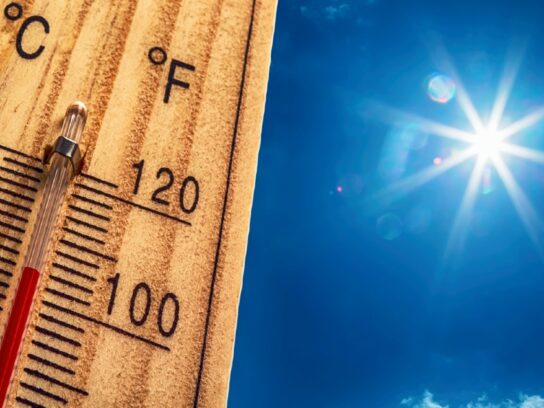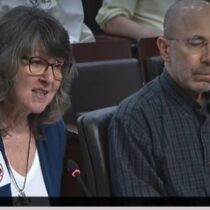
Montgomery County is under a Heat Emergency Alert until 8 p.m. Monday.
The county’s Office of Emergency Management and Homeland Security (OEMHS) issued the alert to begin at noon Sunday and last through 8 p.m. Monday.
The alert is sent when the temperature or heat index is forecast to be 105 degrees Fahrenheit or higher for at least a two-day period, according to a county release. Nighttime temperatures can still be a health threat after extended exposure even though temperatures may be lower.
“The heat index over the next several days will be dangerous,” OEMHS Acting Director Marianne Souders said in the statement Saturday. “We encourage residents to take precautions to protect themselves, their loved ones, and their pets and to check-in on elderly friends, relatives and neighbors to ensure they are not showing signs of heat-related illnesses.”
According to National Weather Service (NWS) Baltimore/Washington on Sunday, most locales “saw highs in the 90s, aside from the mountains where highs were in the 80s. Maximum heat indices were between 100-110 degrees for most locales.”
During operating hours, residents can cool off at county facilities like libraries, pools, recreation centers and senior centers. During service hours, anyone seeking shelter can use Ride On buses, which are free through July.
Never leave people or pets in a parked car for any amount of time, even with an open window. It only takes a few minutes for temperatures inside parked vehicles to climb over 130 degrees Fahrenheit.
The county urges residents to take measures for protection, like stay indoors whenever possible, avoid strenuous outdoor activities, take frequent breaks in a cool area if you are outdoors, drink plenty of water and avoid caffeine and alcohol.
Those at greatest risk for heat-related illness are infants and children up to four years old, people ages 65+, people who are ill or on certain medications, and people who are overweight. The county encourages residents to frequently check on high-risk individuals.
If residents experience symptoms of heat cramps, heat exhaustion or heat stroke, they should remove themselves from heat, loosen/lighten their clothing and drink water. Heat exposure can be life-threatening.
⚠️A HEAT EMERGENCY ALERT is in effect for @MontgomeryCoMD for noon Sunday 7/24 – 8 PM Monday 7/25. Report heat-related concerns for people & pets to: 301-279-8000. Visit County facilities during regular business hours for relief from the heat: https://t.co/hKa4uvWWVZ #MoCo pic.twitter.com/HQ3FB6dLlt
— Montgomery Co OEMHS (@ReadyMontgomery) July 23, 2022
Curious how hot it was today? Most locations saw highs in the 90s, aside from the mountains where highs were in the 80s. Maximum heat indices were between 100-110 degrees for most locales. pic.twitter.com/KCI0Lb43TX
— NWS Baltimore-Washington (@NWS_BaltWash) July 25, 2022


Comments are closed.